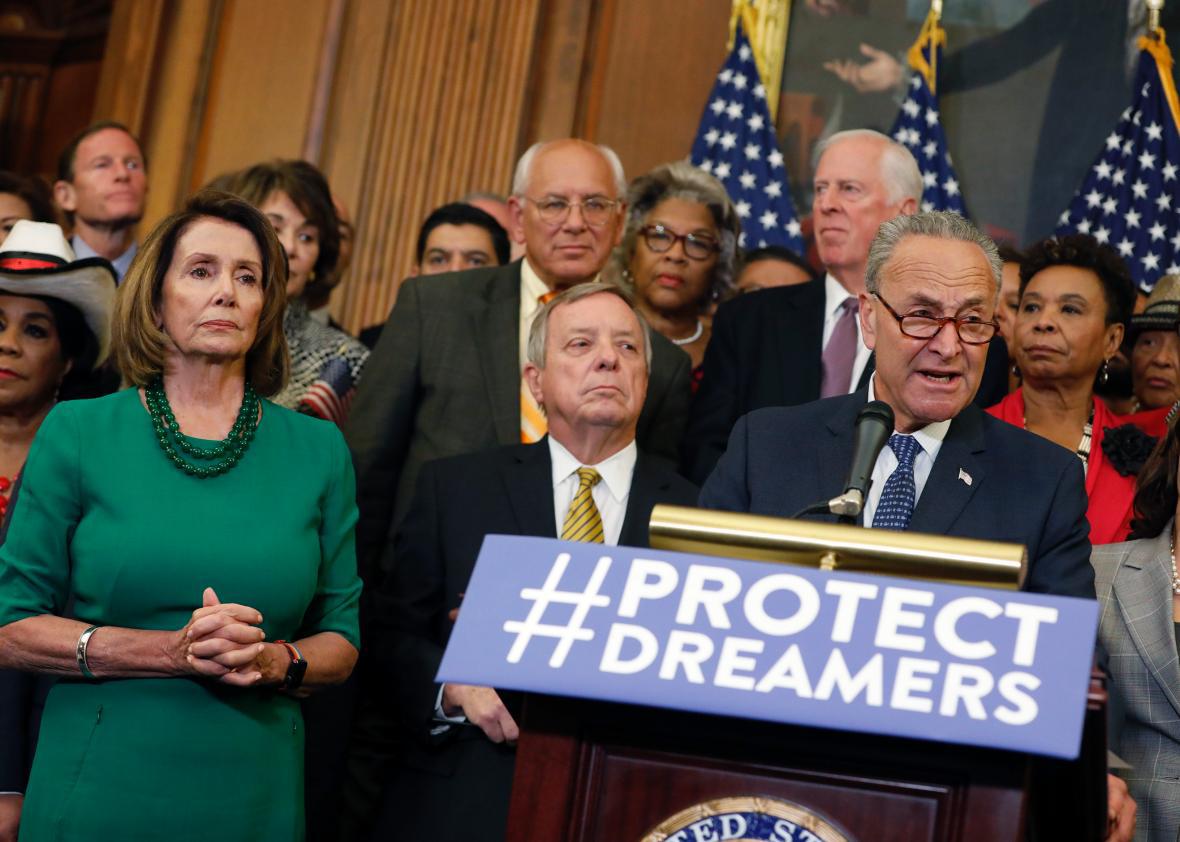Everyone take a deep breath. There is no deal—yet. But President Trump’s dinner with Senate Minority Leader Chuck Schumer and House Minority Leader Nancy Pelosi on Wednesday night did formalize the path through which children of undocumented immigrants brought here at a young age might obtain legal status. What was reached Wednesday night at dinner was an agreement to pursue that path on a bipartisan basis. A “deal” will be reached only when the details are ironed out. Details can be a problem.
In a joint statement after their dinner, Pelosi and Schumer said that “we agreed to enshrine the protections of DACA into law quickly, and to work out a package of border security, excluding the wall, that’s acceptable to both sides.” If there’s news here, it’s that Trump wouldn’t insist on the wall in this particular package. (This does not mean he’s given up on it, as his press secretary was quick to note Wednesday night.) There has been a round or two of clarifications from both sides since then, but the original Pelosi and Schumer statement largely holds up: They and the president agreed to pursue this course of action.
This doesn’t put Congress on a path it wasn’t already on. It was immediately apparent on Capitol Hill last week that the way protections for Dreamers could get through Congress was by linking them up with some sort of non-wall border security component. Though people will be making fun of House Speaker Paul Ryan now that Trump has gone over his head again to negotiate directly with “Chuck and Nancy,” this is really the same path Ryan had laid out for protecting Dreamers already. “It’s only reasonable and fitting that we also address … borders that are not sufficiently controlled while we address this very real and very human problem that’s in front of us,” Ryan said last week.
Now congressional leaders just have to take this broad-strokes framework and fill it in with policy details. The big question seems to be an interpretation of what “enshrining DACA protections” means. It would be a bit silly to “legislate DACA,” a term some have been using as shorthand over the last week, since the Deferred Action for Childhood Arrivals program, announced by President Obama in 2012, was an administrative workaround of Congress. Rather than codifying an administrative workaround of legislation via legislation, Congress could instead just … pass straightforward legislation to fix the identified problem.
Is that legislation the DREAM Act? The DREAM Act reaches further than DACA, both in terms of people affected and in what it offers. Though DACA allowed recipients to get work permits on a temporary basis with the ability to renew, the DREAM Act offers a path to citizenship. That’s going to be an issue for congressional Republicans, especially in the House, since a path to citizenship is what Republicans call “amnesty.” If they’re going to support that, they will need all the cover Trump can offer them. And Trump, himself, could have second thoughts if the blowback is strong enough.
And what, pray tell, is a non-wall border security package that’s “acceptable to both sides”? Lasers and drones and stuff but … not too many lasers and drones and stuff? We’ll have to see. It sounds like something that could get bogged down in tedious semantic debates, our national legislature’s specialty.
An agreement on a framework is something. But a “deal” is of a whole other order. We’re not there yet.
